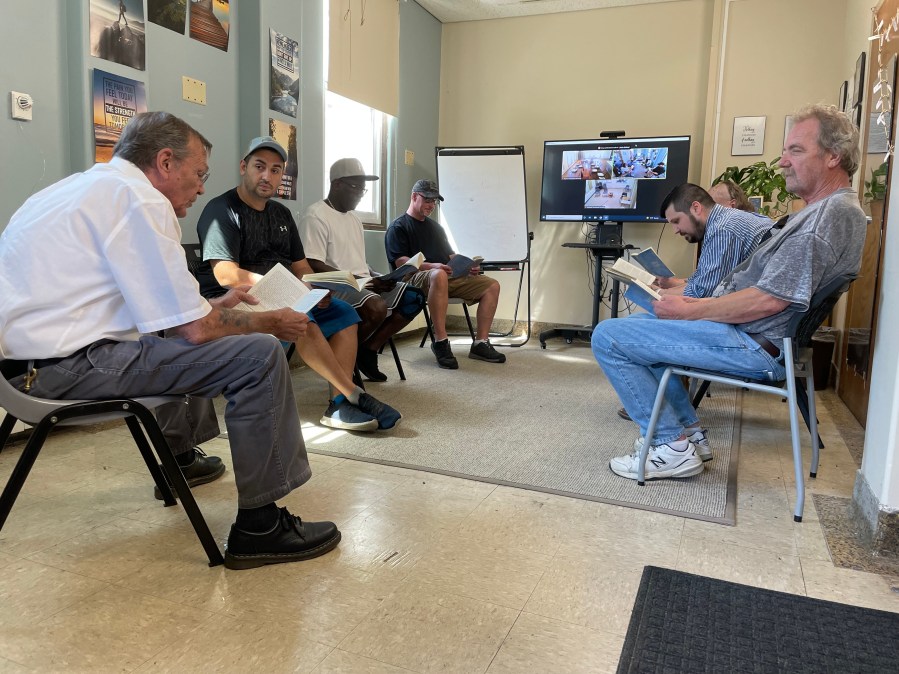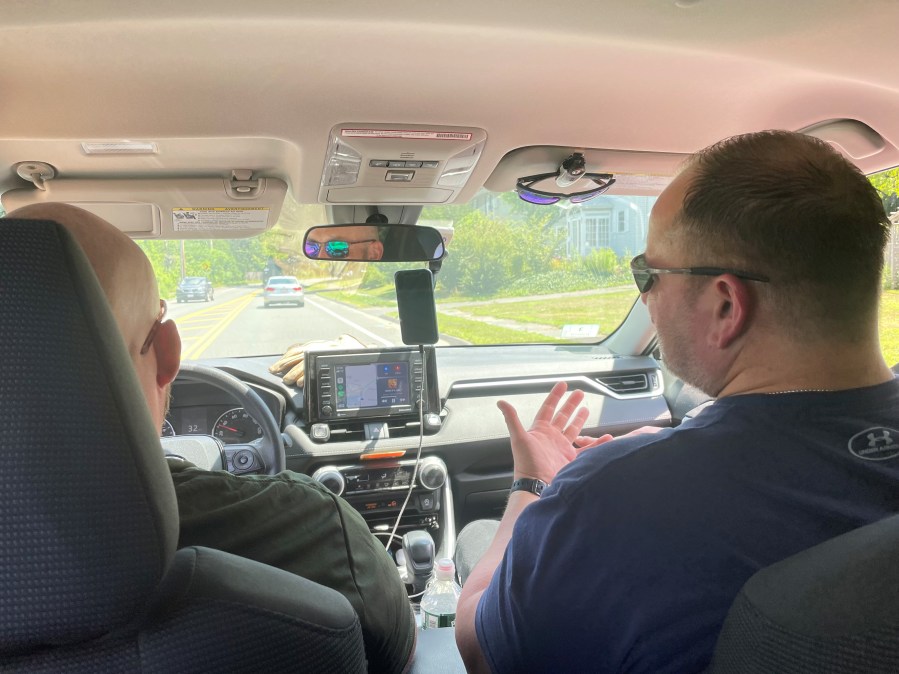Group helps house and employ veterans with dignity
- Soldier On takes a community approach to getting veterans housed and employed
- The rate of veteran unemployment has fallen significantly in recent years
- Still, older vets are more likely to be homeless or struggle with a mental illness

A Soldier On caseworker speaks with a client. Over half of the staff are veterans, and many came to the program after being homeless. Courtesy of Soldier On.
Testing on staging11
(NewsNation) — Recent jobs data has spelled good news for veterans, who face less unemployment than the general public. Still, one group remains hard to reach: older veterans, who may struggle to find employment for a variety of reasons, including homelessness.
The nonprofit Soldier On is helping to close the gap, working to get veterans housed, healthy and employed through a carefully created community.
“These people, the guys and the women that live in our buildings, now have dignity,” said Bruce Buckley, Soldier On’s CEO.
The rate of veteran unemployment has fallen significantly in the years following The Great Recession, when joblessness was significantly higher than among civilians as it surged to more than 15% in Jan. 2011.
That success — particularly with young veterans transitioning from combat to civilian life — is due to the combined efforts of government offices, nonprofits and for-profit businesses to get soldiers returning home prepared to take civilian jobs, said Rosalinda Vasquez Maury, a researcher with the D’Aniello Institute for Veterans & Military Families at Syracuse University.
“It’s not just about coming out and getting your next civilian job,” she said. “It’s understanding how you stop talking about military language when you’re looking for a job. It’s how do you do your resume?”
Still, veterans are unhoused at higher rates than the general public and are more likely to have a history with the criminal justice system, struggle with a mental illness or have an addiction.
While those factors might contribute, the “single-cause” view is too simplistic, Buckley said.

“There’s lots of alcoholics that aren’t homeless. There’s lots of people that don’t have a lot of money, but they’re not homeless,” he said. “Somewhere along the way, they’ve lost their community.”
Soldier On’s approach focuses on rebuilding the veteran’s community first, and it looks different for each person.
They run permanent, affordable housing buildings where rent is based on a percentage of the veteran’s income. The apartments are fully furnished, and more than 100 staff across 10 buildings help homeless veterans rebuild their lives — whether that’s finding mental or physical health care, coordinating transportation to a job, or simply being a friend.
Soldier On partners with local companies such as Smith & Wesson and Yankee Candle, along with the Department of Veteran Affairs, to help former soldiers get placed in jobs in which they can succeed. Veterans can also work for the nonprofit itself, including in their kitchen program that teaches workers from-scratch cooking techniques, as well as safety and management skills.
No matter what the employment looks like, case managers help “craft a schedule, in a circumstance, in a situation that works,” Buckley said. “We’re very conscious of, and have worked with many of them to say, this job isn’t working out. But why don’t we try this job? And usually, we can find a solution.”
Michael Davidson had been in — and left — Soldier On’s housing program when he showed up at one of the organization’s shelters.
“I had been gone for a few months, and I had been out doing some drinking and having generally terrible ideas and plans,” he said, adding one of the workers knew him and his story — and offered a lifeline that changed his life.
The worker first told him to come back the next Monday, Davidson remembers.
“And then as I was about to leave the building, he said, ‘You know what, why don’t you just spend the weekend here, so we can make sure that you get (where you need to be on Monday), instead of going back to your apartment, where you’re probably going to do something stupid,'” he said.
“That moment was actually the last moment that I ever had a drink,” Davison continued.

Davidson tells that story when people ask why Soldier On’s program is so successful. He went on to work in their kitchen, then as a peer mentor, and today he is a case manager.
“I’ve seen lots of different agencies through the years,” he said. “The way that Soldier On does it is just so much different than anywhere else. It’s always been much more personal.”
Just over half of Soldier On’s staff members are former veterans who went through the group’s programs, according to data provided by Soldier On. The majority work as case managers or peer support, welcoming other veterans into the community that helped them heal.
“They can work their way up where they’re paying more of their own rent, up to the whole market rent if they’re making enough money,” Buckley said.
The average age of their residents is 59. Of almost 500 veterans who have lived in their permanent housing since 2011, all but 44 have remained housed until their deaths.
There are even columbaria on each site for residents who pass away.
“A lot of (residents) said, ‘This is my home. … Here, my friends will see me,” Buckley said, adding that a physical building can’t create this sense of family. “It’s the services and the support in the community that we offer — that really is what helps create the permanence.”
